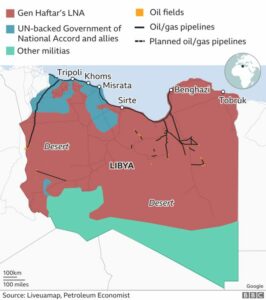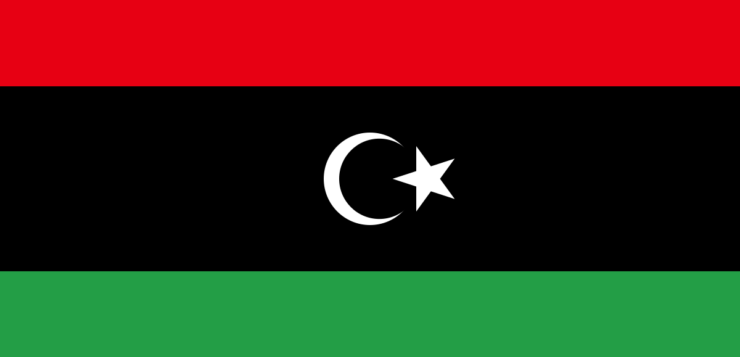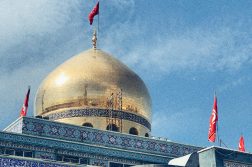Just over nine years ago in 2011, a Multi-state NATO-led coalition commenced on a military campaign that would see Libyan leader Colonel Muammar Gaddafi removed from power and killed on October 20th in the same year by his own people.
While the then leaders of Britain, France, Italy and the US celebrated Libya’s transition from dictatorship to democracy via the creation of the National Transitional Council of Libya in March 2011, Libya’s failure to unite and stabilise itself after nine years demonstrates President Obama couldn’t have been further from the truth when stating ‘Gaddafi’s death is a warning to iron-fist rulers’. Particularly considering the unelected military strongman, General Haftar, has come to a control a majority of Libya’s oil fields, refineries and land-mass after six years, while simultaneously boasting support from Russia, Saudi Arabia, Egypt and Jordan. Power and prominence progressively gathered since a televised address in February 2014, where Haftar stated the elected General National Congress had unilaterally extended its mandate and had been dissolved. A statement immediately condemned by the acting Prime Minister in Ali Zeiden as an attempted coup.
Since bursting onto the scene, General Khalifa Haftar went beyond words in May 2014, launching Operation Dignity. An operation tasked with dismantling the power and influence of The Libyan Muslim Brotherhood and Islamic fundamentalist groups such as ISIS. After officially being made Commander of The Libyan National Army by the House of Representatives in March 2015, due to his military experience, loyalty to the revolution and strong relations with the Salafi organisations in the east of the country, his power has moved from strength to strength. The Libyan army rapidly took control of Benghazi, Sirte and Tobruk from 2014 onwards, thanks in part to the Tobruk-based House of Representatives’ endorsement of the General. The Army’s ability to continuously gain territory and devastate the power of non-state terrorist groups has also seen Haftar gain significant support from previous adversaries such as Zeidan, who endorsed the work of Operation Dignity and Prime Minister Abdullah al-Thani who branded opponents of Haftar ‘terrorists’.

In spite of much endorsement Haftar has not been far from criticism. Opponents of the Commander have argued the military official is “the biggest obstacle to peace”, considering his refusal to endorse the UN-backed and democratically elected Government of National Accord in August 2016. This behaviour demonstrates he is unlikely to ever accept any national authority unless he is leading it. Critics have also argued Hafter has abused Operation Dignity’s pretence of ridding Libya of militant extremism and used it to waged war against religious groups and militias who oppose him. As demonstrated by his shelling of The Derna Mujahideen Shura Council in early 2016 who were integral to the ousting of ISIS from the eastern port city. Hatar has also exhibited unquestionable brutality during the ongoing civil war with videos depicting Libyan soldiers executing 20 suspected ISIS fighters in July 2017, actions condemned by the U.N. According to former Spokesperson of Dignity Operation Mohammed Al-Hijazi, who left the organisation in January 2016, these actions of “The Tyrant”, such as “killings, kidnappings, destruction and forced disappearances” were common. Claims substantiated by his blocking of U.N Humanitarian aid in early February and claims in a televised address of late April that he had a “popular mandate” to rule the nation.
Regardless of the legitimate criticism of Haftar and his followers, this military official has been able to successful solidify his power in east Libya. Namely due to Prime Minister Fayez Sarraj’s inability to be viewed as a legitimate national figure of authority, with local tribes loyalties and sectarian identity continuing to dominate a country riddled with infighting, inflation, corruption, and smuggling since 2011. So much so that the southern border is almost exclusively held by local militia forces. The National Governments claim to national authority has also furthermore been damaged by Toburk’s House of Representatives’ rejection of Sarraj’s proposed cabinet in October 2017. As the U.N Security Council succinctly stated in April 2017, the Government has struggled to “deliver basic services while endeavouring to fight terrorism, illegal migration and oil smuggling”. In spite of the Government’s failure to consolidate or retain its democratically obtained authority, Sarraj’s forces have been able to regain full control of Libya’s capital, Tripoli, and push Haftar’s forces out on June 4 after a lengthy siege. Government forces have additionally taken the strategically important al-Watiya airbase near the Tunisian border from Haftar forces on May 18 and Tarhouna, the last western stronghold of General Haftar. Evidence suggests the war may eventually be turning against Haftar.
The battle and bloodshed of The Second Libyan Civil War has been further intensified and prolonged by the intervention of regional and global powers on a proxy level. Evidence suggests Russia has provided Haftar’s forces with Russian military jets and deployed the infamous Wagner Group, a para-military organisation controlled by the Kremlin. Haftar is also receiving support from Libya’s neighbours, Egypt and Jordan, who believe General Haftar is in the best position end the civil war and provide long-term national and regional stability. This viewpoint is also held by Italy and France. While officially supporting Sarraj’s Government, inline with EU and U.N policy, both nations view good relations with Haftar as essential to preventing a repeat of the European Migration Crisis of 2015, which emanated from Libya. Furthermore they want to see seamlessly European access to Libyan oil and prevent a resurgence in regional terrorism. After Haftar blocked global oil exports in January 2019, Turkey have conversely backed Sarraj’s alongside Qatar. They want to reduce expanding Russian regional influence and avoid a maritime ‘chokepoint’. Turkey fears the creation of a national Haftar Government would see The Libya-Turkey Maritime Deal of May 2020 immediately rescinded and Turkey isolated from exclusive economic maritime zone of the Mediterranean between Greece, Cyprus and Egypt.
With Libya fully engulfed in a bitter civil war, sides unlikely to yield and Berlin-based ceasefire talks collapsing this January, Libyans, Europeans and oil rich nations will be hoping the intensifying proxy involvement of global and regional powers doesn’t turn Libya into “the new Syria”.




